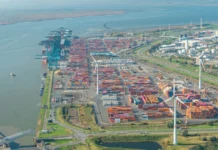
The Port of Cork, Ireland’s second-largest port, confirmed on 20 March that its freight operations are continuing to operate and that its arrivals schedule remains unaffected.
The normal operation of the Port of Cork is a very crucial factor in Ireland’s fight against the coronavirus according to Conor Mowlds, Chief Commercial Officer of Port of Cork.
“Without a well-functioning supply chain we’re going to find it much more difficult to overcome the challenges posed by Covid-19,” he commented to Container News. “For the approximately 40% of Ireland that lives in its southern counties, that requires the Port of Cork to be running smoothly.”
The last update about Cork Container Terminal operations released on 31 March 2020 following the announcement by the Department’s of Health and the Taoiseach in respect of Public Health Measures in place until 12 April that will prevent the spread of Covid-19, the contractor made safe its site at Ringaskiddy yesterday. There are no contractor employees working on the site today. The Construction Industry Federation has also called on its members to secure its sites at this time.
The port says it has taken additional measures to ensure the safety of all employees and visitors, while its preparedness plan has also been implemented, activating the proactive execution of all necessary measures to ensure operational continuity.
Mowlds told Container News “In line with Irish Health Service Executive advice, we are subjecting all arriving and departing ships to strict new guidelines to ensure that all cargoes are free from Covid-19.
In addition to our robust hygiene policies, we have increased our cleaning frequency and intensity, with particular emphasis on those areas which are more heavily trafficked.”
He added, “The transit times for most imported goods to Cork substantially exceeds the length of time the virus can exist on surfaces such as plastic, cardboard, or stainless steel.”
Captain Paul O’Regan, Harbour Master and Chief Operations Officer of Port of Cork, said: “We have put additional sanitisation measures in place to ensure that all vessels berthing in Cork have a clean bill of health.”
In a Container News question about the potential recovery, once the pandemic eases, Mowlds said it is difficult to predict as to when full service across all trades will resume.
The novel coronavirus has affected ports worldwide. Even if Brexit has caused severe difficulties for almost two years, especially to the ports of the United Kingdom and Ireland, the impact of Covid-19 is so intense that the virus has put Brexit issues on the back-burner.
Mowlds commented, “In some way, the challenges brought about by Brexit, which dominated our business preparations for so long, have become of a secondary importance as we deal with the war on Covid-19.”
Antonis Karamalegkos
Editor




